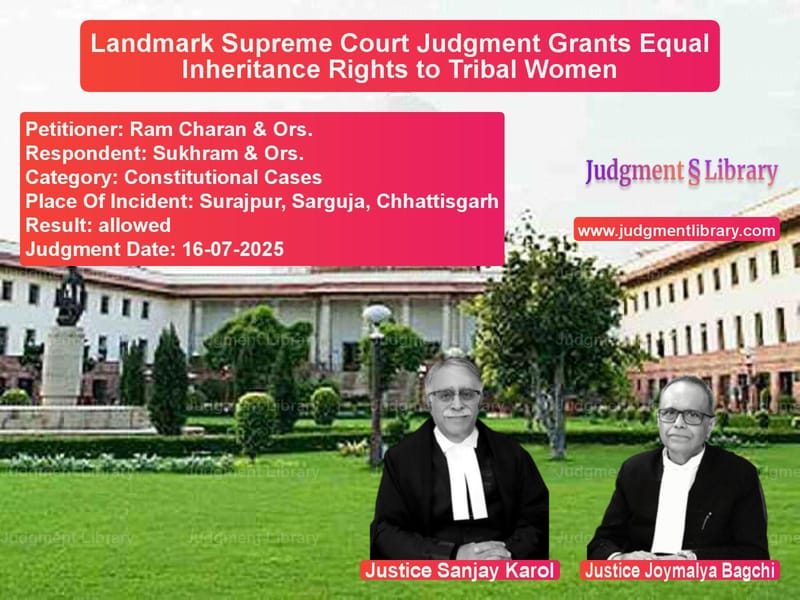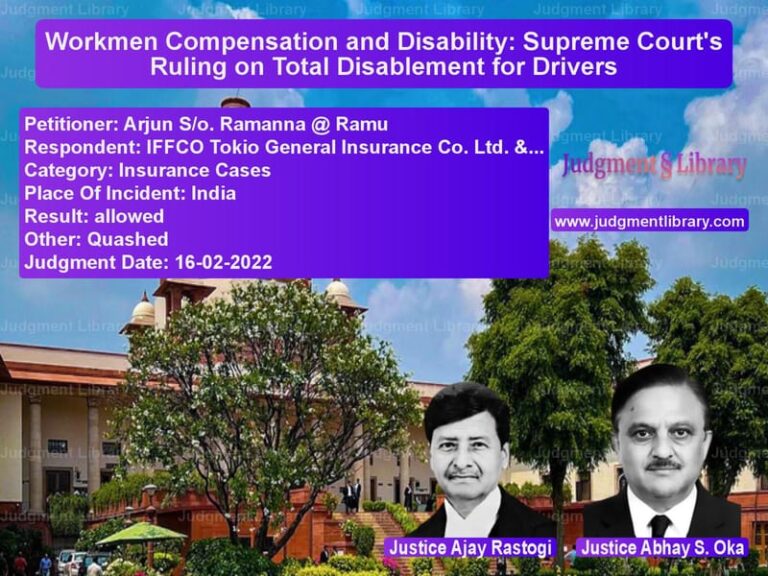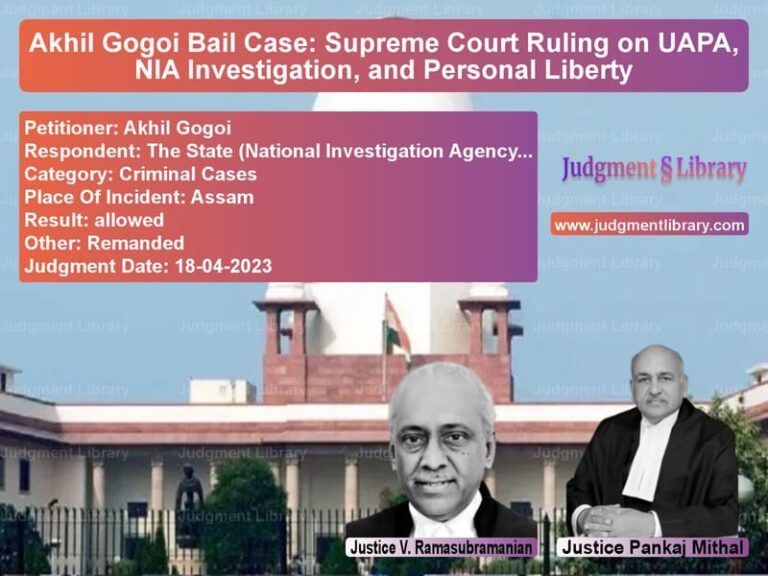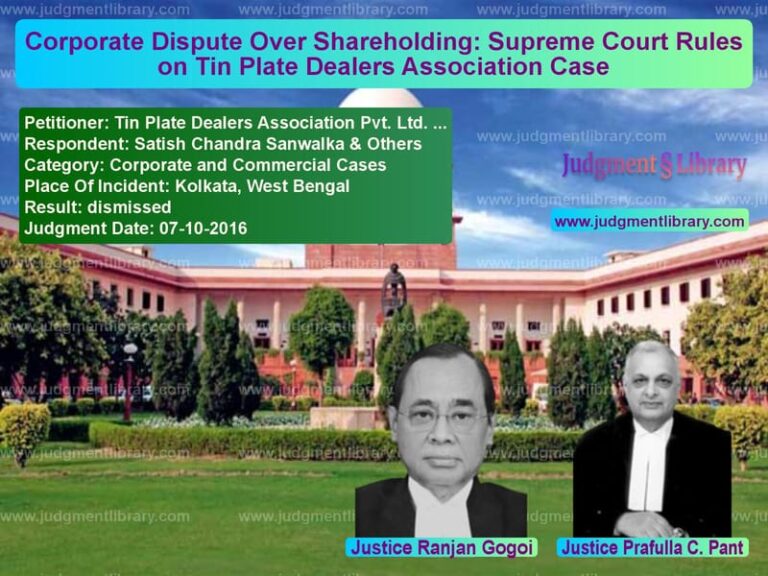Landmark Supreme Court Judgment Grants Equal Inheritance Rights to Tribal Women
In a powerful and progressive judgment that resonates with the core principles of equality and justice, the Supreme Court of India has delivered a landmark verdict, ensuring that tribal women are not denied their rightful share in ancestral property. The case of Ram Charan & Ors. versus Sukhram & Ors., decided on July 17, 2025, addresses a long-standing issue of gender discrimination within tribal communities concerning inheritance. The legal journey began when the appellants, the legal heirs of a tribal woman named Dhaiya, sought partition of the property belonging to their maternal grandfather, Bhajju alias Bhanjan Gond. Dhaiya was one of six children—five sons and one daughter. The appellants argued that their mother was entitled to an equal share in the property, a claim that was consistently rejected by the lower courts.
The Trial Court and the First Appellate Court dismissed the suit, primarily on the grounds that the plaintiffs had failed to prove a specific custom within their Gond tribe that allowed daughters to inherit property. Since Scheduled Tribes are explicitly excluded from the application of the Hindu Succession Act, 1956, the courts below insisted on the proof of a customary right. The High Court, in its impugned judgment, affirmed these findings, leading the appellants to approach the Supreme Court. The central question before the Apex Court was stark and significant: Should a tribal woman, or her legal heirs, be entitled to an equal share in her ancestral property in the absence of any specific law or custom governing inheritance?
The Supreme Court, in its wisdom, recognized that the lower courts had approached the case with a misplaced assumption. They had presumed an exclusionary custom where daughters were not entitled to inherit and placed the burden of proving otherwise on the plaintiffs. The Court noted that an alternate scenario was equally plausible—one could presume inclusion and place the burden on the defendants to prove that women were excluded. This patriarchal predisposition, the Court observed, had no place in modern jurisprudence, especially when it resulted in denying women their fundamental rights.
The Legal Void and the Principle of Justice, Equity, and Good Conscience
Since the parties were not governed by Hindu law or any other codified personal law, the Court turned to the principle of ‘justice, equity, and good conscience’ to fill the legal void. This principle finds its roots in Section 6 of the Central Provinces Laws Act, 1875. The High Court had erroneously held that this Act, having been repealed in 2018, was no longer applicable. The Supreme Court corrected this, pointing to the saving clause in the Repeal Act. The Court authoritatively stated: “The effect of Section 4 is clear that no right having been accrued prior to the repeal of the Act shall be affected thereby.” Since the right of the appellants’ mother accrued upon her father’s death, which occurred decades before the repeal, the 1875 Act and its guiding principle were very much applicable.
The Court delved into the meaning and application of ‘justice, equity and good conscience,’ drawing from a rich history of judicial precedent. It referred to the Constitution Bench decision in M. Siddiq v. Suresh Das (the Ram Janmabhoomi Temple case), which provided a comprehensive understanding of the principle. The Court quoted the following pivotal passage: “Where the existing statutory framework is inadequate for courts to adjudicate upon the dispute before them, or no settled judicial doctrine or custom can be availed of, courts may legitimately take recourse to the principles of justice, equity and good conscience to effectively and fairly dispose of the case. A court cannot abdicate its responsibility to decide a dispute over legal rights merely because the facts of a case do not readily submit themselves to the application of the letter of the existing law.”
The Court also relied on its recent judgment in Tirith Kumar v. Daduram, which involved a similar factual matrix from Chhattisgarh and where the principle was applied to grant rights to female heirs. This consistent judicial approach underscored that in the absence of law or custom, courts must lean towards a just and equitable outcome.
The Unassailable Mandate of Article 14
Beyond the application of general principles, the Supreme Court powerfully anchored its judgment in the fundamental right to equality guaranteed under Article 14 of the Constitution. The Court found that denying a female heir a right to property, where no law or custom expressly prohibited it, constituted a blatant violation of Article 14. The Court observed that there was no rational nexus or reasonable classification for granting succession rights only to males and not females. It emphatically stated: “There appears to be no rational nexus or reasonable classification for only males to be granted succession over the property of their forebears and not women, more so in the case where no prohibition to such effect can be shown to be prevalent as per law.”
The judgment extensively discussed the jurisprudence surrounding Article 14. It cited the landmark case of Maneka Gandhi v. Union of India, where the Court held that equality is a dynamic concept and that Article 14 strikes at arbitrariness in state action. The Court quoted: “Equality is a dynamic concept with many aspects and dimensions and it cannot be imprisoned within traditional and doctrinaire limits… Article 14 strikes at arbitrariness in State action and ensures fairness and equality of treatment.”
The Court also drew inspiration from the progressive step taken by Parliament in the Hindu Succession (Amendment) Act, 2005, which made daughters coparceners in joint family property. It reproduced the ‘Object and Reasons’ of the Bill, which stated that excluding daughters from coparcenary ownership “not only contributes to her discrimination on the ground of gender but also has led to oppression and negation of her fundamental right of equality.” The Supreme Court expressed the view that a similar ethos must apply to tribal communities to weed out gender division and discrimination.
The Court’s Final Ruling and Its Far-Reaching Impact
After a thorough analysis, the Supreme Court arrived at a firm conclusion. It held that the appellants, being the legal heirs of Dhaiya, were entitled to an equal share in the property of their grandfather. The Court set aside the judgments of the courts below and allowed the civil appeal. In its final pronouncement, the Court declared: “We are of the firm view that in keeping with the principles of justice, equity and good conscience, read along with the overarching effect of Article 14 of the Constitution, the appellant-plaintiffs, being Dhaiya’s legal heirs, are entitled to their equal share in the property.”
This judgment is a monumental step towards achieving substantive gender equality in India. It sends a clear message that customs cannot be used as a shield to perpetuate discrimination and that the Constitution’s guarantee of equality will prevail in the face of archaic and unjust practices. By applying the timeless principles of justice, equity, and good conscience, coupled with a robust interpretation of Article 14, the Supreme Court has ensured that tribal women are no longer relegated to the sidelines when it comes to property rights, affirming their equal status in the eyes of the law.
Petitioner Name: Ram Charan & Ors..Respondent Name: Sukhram & Ors..Judgment By: Justice Sanjay Karol, Justice Joymalya Bagchi.Place Of Incident: Surajpur, Sarguja, Chhattisgarh.Judgment Date: 16-07-2025.Result: allowed.
Don’t miss out on the full details! Download the complete judgment in PDF format below and gain valuable insights instantly!
Download Judgment: ram-charan-&-ors.-vs-sukhram-&-ors.-supreme-court-of-india-judgment-dated-16-07-2025.pdf
Directly Download Judgment: Directly download this Judgment
See all petitions in Fundamental Rights
See all petitions in Constitution Interpretation
See all petitions in Property Disputes
See all petitions in Succession and Wills
See all petitions in Public Interest Litigation
See all petitions in Judgment by Sanjay Karol
See all petitions in Judgment by Joymalya Bagchi
See all petitions in allowed
See all petitions in supreme court of India judgments July 2025
See all petitions in 2025 judgments
See all posts in Constitutional Cases Category
See all allowed petitions in Constitutional Cases Category
See all Dismissed petitions in Constitutional Cases Category
See all partially allowed petitions in Constitutional Cases Category







